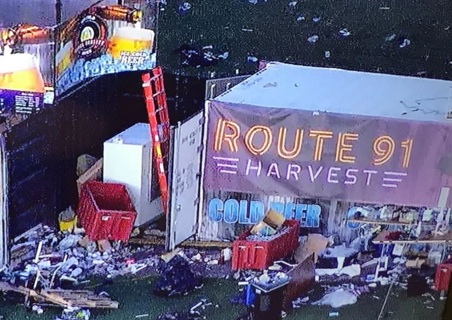Tens of thousands of people will gather this weekend for the Austin City Limits Festival, a two-week music festival about a mile from downtown Austin.
“It’s gonna be the safest part of the city to be in during both weekends, just because of the sheer number of officers that will be present,” said Brian Manley, the chief of the Austin Police Department, during a press conference this week. Manley said the department will have officers inside and outside the festival, with heightened attention to threats from outside the gates.
“We want folks to come out, we want you to enjoy yourself,” he said. But he also warned that “we live in a world now where you cannot protect against every single threat.”
That was made all too clear to police in Austin and across the country on Sunday night, when the deadliest mass shooting in recent U.S. history left 58 people dead and close to 500 injured at a country music festival in Las Vegas. It was the just latest assault on a music venue, after the mass shooting at the Bataclan theater in Paris in 2015, and the suicide bombing outside an Ariana Grande concert in Manchester in 2016.
The Las Vegas shooting is a chilling reminder that big public concerts remain a soft target. And the industry is still grappling with what lessons it should draw from the massacre. “A nightmare scenario” is the way Chris Robinette described Sunday’s attack. Robinette is the president of Prevent Advisors, the security branch of Oak View Group, a company that advises major sports and entertainment venues. The shooter fired from the 32nd floor of the Mandalay Bay hotel, which is separated from the concert site by a major interstate highway. Robinette predicted that the gunman’s distance from the event would force outdoor venues to pay more attention to potential threats from outside the gates.
“if we’re talking about outdoor events, it’s important that we think about adjacent buildings,” Robinette said, including “rooftops and balconies and things where threats might now originate, that they didn’t historically come from. So that’s becoming a very, very relevant issue at this point.”
“People will continue to have concerts. People will continue to go to concerts,” says Danny Zelisko, president of Danny Zelisko Presents, which promotes shows at The Pearl at the Palms and at venues in Arizona. “People will be looking over their shoulders a little bit more, like they do at so many everyday things that we’ve always taken for granted.”
“My guess is that from here in, it’ll be a different game in that we’ll have to look even beyond the perimeter of these events,” Christenson says. “It’s just tragic, but I think this is a very proactive police force and once all this settles down, they can look at what has to be done now. I think that, knowing the track record of Metro and everybody that works around crowd management and security, there will be another layer of protection.”
Christenson points to the Metropolitan Police Department’s experience in overseeing massive gatherings as a key preventive advantage moving forward.
“These guys are experts at crowd management,” he says. “You look at the Strip on New Year’s Eve and the (Electric Daisy Carnival) — those things don’t just happen. They have a system in place.” The system may need to be tweaked, though the challenge, of course, is trying to predict the unpredictable.
“Everybody who puts on shows thinks about things like, ‘What if this? What if that?’ but you can’t possibly prepare yourself for this,” Zalisko says. “There really is no great answer to defending yourself against the impossible. It’s like defending yourself against an earthquake.”
Israel leads the world in security for concerts and, like their airport security, the world has a lot to learn, political correctness has to take a back seat and money will always play a big part. Tickets for the Guns N’ Roses show in Hayarkon Park, Tel Aviv, start at 355 shekels ($101 USD) for lawn seats, but if you catch the band in Munich, you’ll only pay 328 shekels ($93 USD). In Australia, you’d pay 230 shekels ($65 USD), and in St. Louis, 226 shekels ($64 USD) Moscow 220 shekels ($62 USD).

